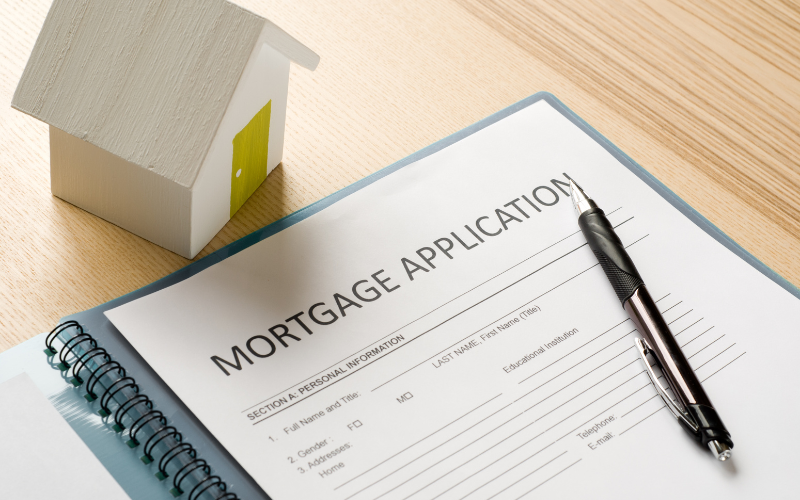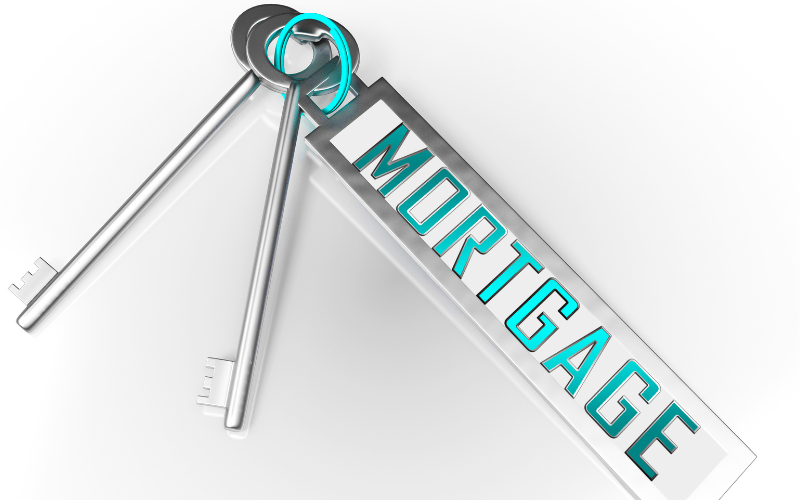Buying a home is one of life’s most exciting milestones, but it can also feel overwhelming—especially when it comes to navigating the mortgage process. For those purchasing in Raleigh, NC, the stakes are even higher. Raleigh’s vibrant real estate market moves quickly, and avoiding mortgage missteps can make the difference between securing your dream home and missing out.
Whether you’re drawn to the bustling energy of Downtown Raleigh, NC the family-friendly neighborhoods of North Raleigh, NC or the scenic charm of Falls Lake, understanding the mortgage process is essential. This guide dives deep into the five most common mortgage mistakes buyers make and provides practical advice to help you avoid them.
CHAPTER

1. Not Getting Pre-Approved Before You Start House Hunting
You’ve seen it before: A buyer falls in love with a home, makes an offer, and then learns they can’t secure the financing needed to close. It’s a frustrating and disheartening experience, but one that’s entirely preventable by getting pre-approved.
Why Pre-Approval Matters:
Pre-approval isn’t just a nice-to-have—it’s a must in a competitive market like Raleigh. Here’s why:
- Budget Clarity: Pre-approval helps you understand exactly how much home you can afford. This prevents you from falling in love with homes outside your price range.
- Stronger Offers: Sellers take your offer more seriously when it’s backed by a pre-approval letter. In a city where multiple offers are common, this can make all the difference.
- Saves Time: When you’re pre-approved, you can move quickly when the right home hits the market—something that’s crucial in Raleigh’s fast-paced environment.
What You’ll Need for Pre-Approval:
To get pre-approved, gather these documents:
- Recent pay stubs and proof of income.
- Tax returns for the past two years.
- Bank statements showing your assets.
- Identification and Social Security number.
Pro Tip: Work with a local lender who understands Raleigh, NC’s unique market. They’ll be familiar with nuances like property taxes, HOA fees, and down payment assistance programs available to North Carolina residents.

2. Ignoring Your Credit Score
Your credit score plays a huge role in determining your mortgage terms, yet it’s often overlooked by buyers until it’s too late. Even small missteps—like a forgotten credit card payment or a new loan—can lower your score and impact your mortgage.
How Your Credit Score Affects Your Mortgage:
- Interest Rates: Higher credit scores qualify for lower interest rates. Over the life of a 30-year loan, even a 1% difference in your interest rate can save you tens of thousands of dollars.
- Loan Eligibility: Certain loan programs, like FHA or VA loans, have minimum credit score requirements. If your score doesn’t meet the threshold, you might not qualify.
Steps to Protect and Improve Your Credit Score:
- Check Your Score Early: Use free tools like AnnualCreditReport.com to review your credit report for errors.
- Pay Down Debts: Lowering your debt-to-income ratio can boost your score and improve your borrowing power.
- Avoid New Credit: Don’t open new credit accounts or take on significant debt during the home-buying process.
In Raleigh, NC a credit score of 700+ can unlock competitive rates and make you a more attractive borrower in the eyes of local lenders.

3. Taking the First Mortgage Offer You Receive
Shopping for a mortgage can feel intimidating, but settling for the first offer you receive is a costly mistake. Rates, fees, and loan programs can vary significantly between lenders, so it’s worth the extra effort to compare.
Why Comparing Lenders Is Critical:
- Interest Rates: Even a slight difference in your interest rate can add up to thousands of dollars over the life of your loan.
- Loan Programs: Some lenders offer unique programs tailored to first-time buyers or those purchasing in North Carolina. These may include reduced fees, down payment assistance, or other perks.
- Closing Costs: Fees like origination charges, underwriting fees, and appraisal costs can vary between lenders.
How to Compare Offers:
- Request Loan Estimates: By law, lenders must provide a Loan Estimate that outlines all the costs associated with your loan.
- Focus on APR: The annual percentage rate (APR) includes both your interest rate and additional fees, giving you a clearer picture of the loan’s total cost.
- Ask Questions: Don’t hesitate to ask lenders about specific programs or rate-lock options that might benefit you.
Raleigh, NC is home to both national lenders and local institutions, so you’ll have plenty of options to explore. Be sure to consider local credit unions and community banks, which may offer personalized service and competitive rates.

4. Underestimating the True Costs of Homeownership
The sticker price of a home is just the beginning. Many buyers focus solely on the down payment and forget to factor in the additional costs of buying and maintaining a home.
Costs to Watch For:
- Closing Costs: These include lender fees, title insurance, property taxes, and escrow deposits. In Raleigh, closing costs typically range from 2-5% of the home’s purchase price.
- Property Taxes: Wake County’s property tax rate is currently 0.75%, but this can vary depending on your neighborhood.
- HOA Fees: If you’re buying in a community like Bedford at Falls River or Hedingham, you’ll need to budget for monthly or annual HOA fees.
- Ongoing Maintenance: From HVAC tune-ups to roof repairs, maintaining a home in Raleigh, NC’s climate comes with its own expenses.
Pro Tip for Raleigh Buyers:
If you’re purchasing in an older neighborhood like Historic Oakwood, factor in the potential costs of updating or maintaining a historic home. Similarly, homes near wooded areas may require regular pest control services.
By building a comprehensive budget that accounts for these expenses, you’ll avoid unpleasant surprises down the road.
5. Making Big Financial Moves Before Closing
You’re under contract, and your closing date is just weeks away. It might feel like smooth sailing from here, but don’t let your guard down just yet. One of the most common mistakes buyers make is altering their financial situation before closing.
Why This Is a Problem:
Lenders monitor your finances right up until closing. Major changes—like switching jobs, financing a new car, or making large cash deposits—can raise red flags and delay your loan approval.
Financial Moves to Avoid:
- Don’t Change Jobs: Even if it’s a better-paying position, changing jobs can complicate your lender’s verification process.
- Avoid Large Purchases: Wait until after closing to buy furniture, appliances, or other big-ticket items.
- Hold Off on Deposits: If you need to deposit large sums of money, document the source and inform your lender in advance.
By maintaining financial stability, you’ll ensure your loan approval process stays on track.
The Raleigh Advantage: Local Tips for Success
Raleigh’s real estate market is unique, and understanding its quirks can give you an edge. Here are a few extra tips to help you navigate the process like a pro:
Take Advantage of Local Programs:
The North Carolina Housing Finance Agency (NCHFA) offers resources for first-time buyers, including down payment assistance and affordable loan options. These programs can be especially helpful if you’re buying in Raleigh for the first time.
Work with a Local Realtor:
A knowledgeable agent can guide you through Raleigh’s diverse neighborhoods and help you find the best home for your needs. They can also connect you with trusted local lenders and inspectors.
Stay Ahead of Market Trends:
Raleigh’s population is growing rapidly, which means rising home values and increased competition. Locking in a mortgage rate sooner rather than later can save you money in the long run.
Buying a home in Raleigh, NC, is an exciting adventure. From the historic charm of Oakwood to the family-friendly suburbs of Cary and Apex, there’s a neighborhood here for everyone. But as thrilling as the journey can be, the mortgage process is one area where you don’t want to cut corners.
Avoiding these common mistakes—like skipping pre-approval, ignoring your credit score, or underestimating costs—can save you time, money, and unnecessary stress. With the right preparation and support from local experts, you’ll be well on your way to finding your dream home in Raleigh, NC.
So, are you ready to start your journey? Let’s connect! Whether you need help finding the perfect neighborhood, understanding Raleigh’s real estate market, or navigating the mortgage process, I’m here to guide you every step of the way. Let’s make your Raleigh home-buying experience smooth, successful, and—most importantly—exciting!
FREQUENTLY ASKED QUESTIONS
1. Why is mortgage pre-approval important when buying a home in Raleigh, NC?
Mortgage pre-approval helps you understand your budget, makes your offers more competitive, and allows you to act quickly in Raleigh’s fast-paced real estate market.
2. How does my credit score impact my mortgage options in Raleigh?
A higher credit score can help you secure lower interest rates and meet eligibility requirements for specific loan programs, such as FHA or VA loans.
3. What costs should I budget for beyond the home’s purchase price?
Additional costs include closing fees, property taxes, HOA fees, and ongoing maintenance, which can vary depending on the neighborhood in Raleigh, NC.
4. Should I compare multiple lenders before choosing a mortgage?
Yes, comparing offers from different lenders can save you money through better interest rates, lower fees, and access to special loan programs tailored to North Carolina buyers.
5. What financial moves should I avoid before closing on a home in Raleigh?
Avoid changing jobs, making large purchases, or depositing significant sums of money without documentation, as these can delay your loan approval process.
Ready to Make Your Raleigh Home Dreams a Reality?
Don’t let common mortgage mistakes stand in your way! Whether you need expert advice, local insights, or help navigating Raleigh’s vibrant real estate market, I’m here to guide you every step of the way. Contact me today to get started on your journey to homeownership in Raleigh, NC! 📞🏡








